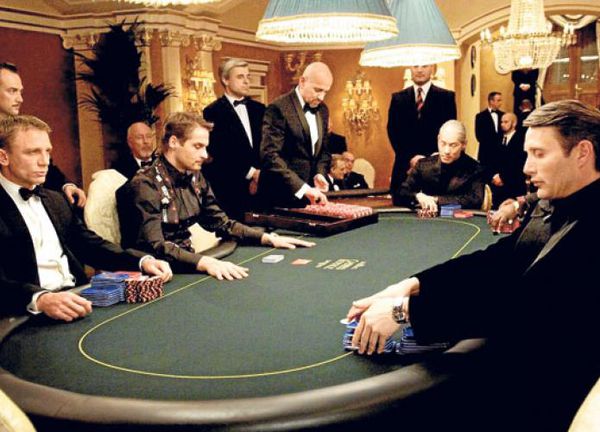Eye For Film >> Movies >> Casino (1995) Film Review

Martin Scorsese understands gangsters better than anyone. With Mean Streets, he followed the lives of small-time hoods in Little Italy. In Goodfellas, he showed us the ups and the downs of gangster life for those that climb the ladder a few rungs then, of course, hit every rung on the way back down. And the third in this unofficial trilogy is Casino. Based in Las Vegas in the Seventies, the original Sin City, we are now presented with the hierarchy of the underworld, the absolute top of the tree.
Robert De Niro plays Sam "Ace" Rothstein, a professional gambler selected by the mob to run the biggest casino in town. He is a businessman who wishes to lead as legitimate a business as possible. However, when childhood friend, the psychopathic Nicky Santoro turns up with his own very different agenda, it's only a matter of time before cracks in their glitzy empire start to show.

The film may be based on true events, but the story reads like a tale adapted from Greek mythology. Ace and Santoro are like gods, they find themselves in a situation where they have monumental power, but, as with all Greek gods, they have fatal flaws. Ace's tragic mistake is falling in love with sexy call girl Ginger (Sharon Stone), a beautiful temptress who screws with his head and never falls out of love with her pimp, Lester Diamond (James Woods). Nicky's Achilles heel is his ego and his stupidity and a clever aspect of the narrative is knowing that it will catch up with him, but not quite knowing how, or when.
Joe Pesci is scarily at ease playing Nicky, seeming to relish the role of a brutal, cold-blooded heavy. He somehow exceeds the violent presence that he previously achieved in Goodfellas, perhaps because in this situation, where the world is their oyster, his spontaneous acts of ferocity seem unnecessary. Santoro is a time bomb and whenever he is onscreen you know that he can go off at any minute. You wouldn't have wanted to meet the original character in real life, but it makes for electric cinema.
With a film based in a man's world and featuring what is largely Scorsese's stock cast, it is unsurprising that the stand-out performance belongs to Stone, who finally lands herself a decent role and sure as hell makes the most of it, crying her way through scenes convincingly, as her character's world falls apart. Her often comic relationship with her bumbling no-good pimp also provides some light relief, a necessary dynamic considering the length of the film and Pesci's sickeningly bloody moments that splatter across the screen and stain the memory.
With Pesci and De Niro turning in their umpteenth roles in Scorsese's films, it might seem on the surface that Casino is just Goodfellas in Las Vegas, but this would be an unfair and naive assumption, which disregards the true story on which the film is based. It also features a dual narrative, with both De Niro and Pesci's characters providing their versions of events in alternating voice-overs. This device works brilliantly, adding a layer of depth not found in the film's prequel. It also makes the unfolding fates of the two protagonists all the more curious to the audience, especially as the film opens with Ace getting blown up in a car.
Like his collaborator Nicholas Pileggi, an author famous for his mobster obsession, Scorsese makes these films, not because of the kudos that surrounds such characters or because gangster films are cool, but because of a genuine fascination for that lifestyle and the quality of the stories that arise out of it. Such passion shines through in Casino, a masterfully directed, acted and edited epic which confidently takes its time in telling its story because, like Vegas itself, it knows that it will dazzle and seduce you.
This is one casino that won't leave you feeling short changed.
Reviewed on: 11 Jul 2005

















